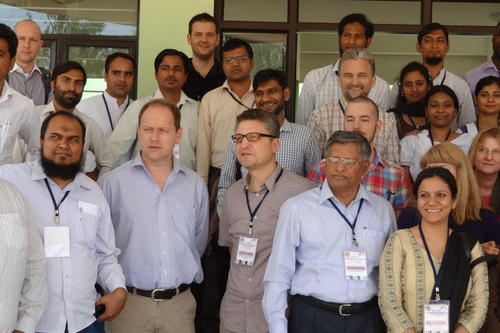Looking for the Difference
Doctoral candidates from Germany and India study the foundations of infectious disease in humans
Jan 27, 2014
Within the Indian-German research training group “Functional Molecular Infection Epidemiology” at Freie Universität’s Institute of Microbiology and Epizootics, doctoral students from India and Germany study the foundations of infectious disease.
Image Credit: Torsten Semmler
Sometimes all it takes is a mosquito bite to make a person sick, or a neighbor on the bus coughing. While transmission of illnesses such as malaria and tuberculosis has already been researched exhaustively, other aspects are still puzzling to researchers.
“For example, we study genetic variation among pathogens, which is one of the factors that determine whether an infection is severe or mild,” says Professor Lothar Wieler of the Institute of Microbiology and Epizootics at Freie Universität Berlin.
Wieler has been in charge of the Indian-German research training group “Functional Molecular Infection Epidemiology” at Freie Universität for three years. The group studies the molecular bases of human infectious disease. Since 2010, the German Research Foundation (DFG) has provided support every three years for 13 junior scientists who wish to write a dissertation on a topic in this area or complete a postdoc project in the field.
One unusual aspect of the training group is the cooperation partner: the University of Hyderabad, located in the Indian state of Andhra Pradesh. It is considered the top university in the country, Wieler says. “There is still a great belief in progress through science there. The people are highly willing to experiment, and they want to help others,” he says.
The area has even earned the nickname “Cyberabad” for the large amount of expertise on IT-related topics that is clustered there. This benefits participants in the training group, for instance, during stays as guest researchers at Indian partner institutions that work with digital modeling. During these activities, researchers use computers to test how changes in human genetic material affect the structure of molecules that detect pathogens. This helps to explain why certain people are more or less susceptible to certain infectious diseases.
Indian Partners Focus on Progress through Research
When Indian doctoral candidates visit Berlin for a six-month stay in return, they do research at local partners such as the Max Planck Institute for Infection Biology, the Robert Koch Institute, or Charité. The research training group also plans to use Indian data on patients with infectious diseases.
“We can’t always plan easily for how things will go, though,” Wieler says. Sometimes customs authorities get involved, for example, when materials are sent back and forth. Still, Wieler says, the doctoral candidates cope well with these kinds of uncertainties and with cultural differences, both individually and as a group.
The German-Indian research training group is still unusual; the DFG is only supporting one other institution of this kind. And that in turn means demand is high. Last summer, 300 people from all over the world applied for eleven spots. “The amount of coordination needed to arrange a residence permit or a visa should not be underestimated,” says Wieler, “but at the same time, India offers a vast realm of possibilities.”
Further Information
Prof. Dr. Lothar H. Wieler, Freie Universität Berlin, Department of Veterinary Medicine, Institute of Microbiology and Epizootics, Tel.: +49 30 838 51796, Email: Lothar.Wieler@fu-berlin.de

